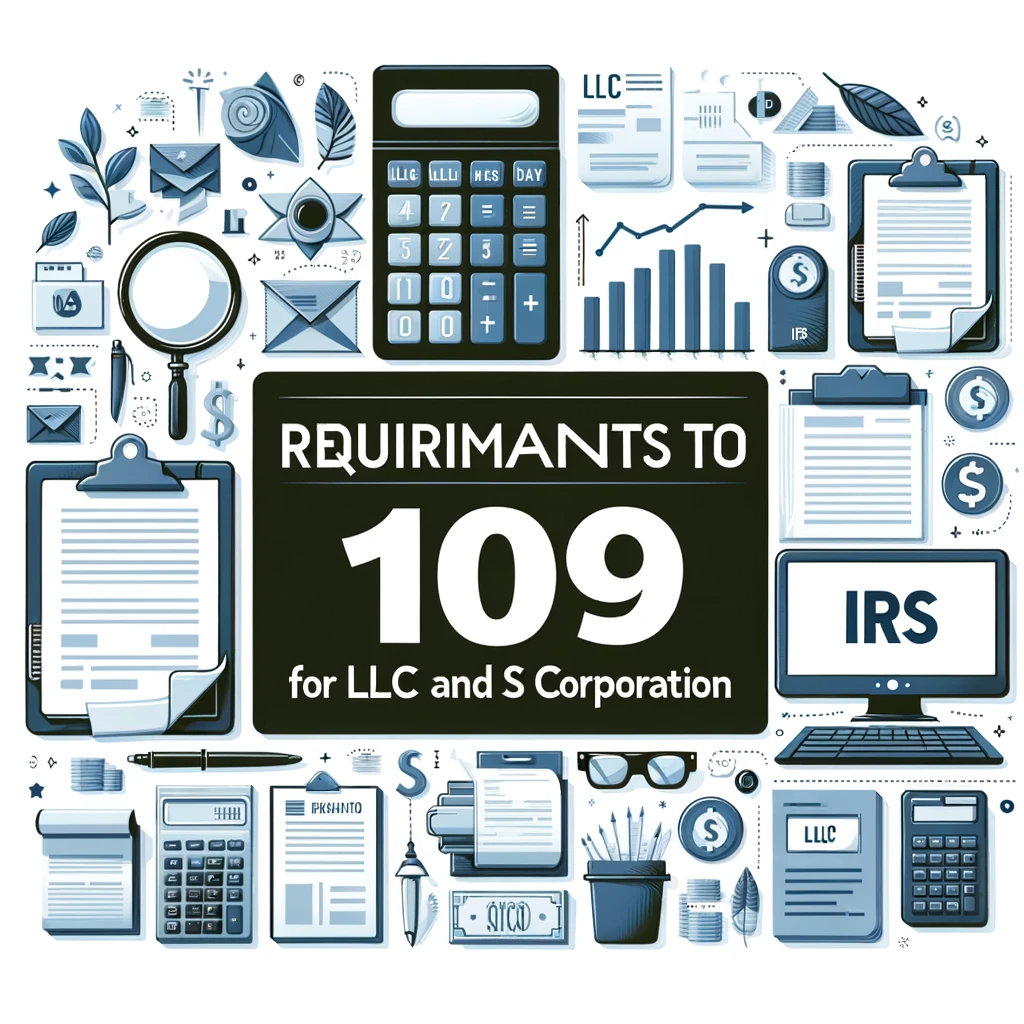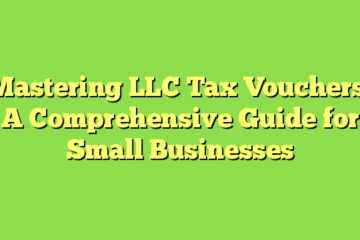Welcome to the “Essential Guide to 1099 Requirements for LLCs and S Corporations.” Navigating the complexities of tax requirements and legal compliances can be daunting for business owners.
This comprehensive guide is designed to simplify these complexities, focusing on the critical aspects of 1099 requirements for Limited Liability Companies (LLCs) and S Corporations.
Whether you’re a seasoned business owner or new to the entrepreneurial world, this guide offers valuable insights to help you understand and effectively manage your tax reporting obligations.
The cornerstone of sound business management lies in understanding and adhering to tax requirements. This guide not only explains the basics of LLCs and their tax classifications but also delves into the specifics of 1099 forms, including 1099-NEC and 1099-MISC, and the conditions under which they are required. By understanding these crucial elements, businesses can ensure compliance, avoid penalties, and maintain a strong financial standing.
LLC Tax Classification
“LLC Tax Classification” is a crucial aspect for any Limited Liability Company (LLC), as it determines how the business is taxed. An LLC can be taxed as a sole proprietorship, partnership, or corporation.
A single-member LLC is typically taxed as a sole proprietorship, meaning profits and losses pass through to the owner’s personal tax return.
Multi-member LLCs are generally taxed as partnerships, with income and losses passed through to members’ personal tax returns. However, LLCs can also opt for corporate taxation, either as an S Corporation or a C Corporation, which can offer different tax benefits such as self-employment tax savings or corporate tax rates.
The choice of tax classification impacts the company’s tax liabilities and reporting requirements, making it a vital decision that can affect the business’s overall financial health.
Understanding Different Tax Options for LLCs
This section explains how an LLC can choose to be taxed as a sole proprietorship, partnership, or corporation. It delves into the implications of each tax classification and helps LLC owners make informed decisions about their tax status.
Limited liability companies (LLCs) can choose how they want to be taxed by the IRS using “tax elections.” The most common tax classifications for LLCs are:
- Sole proprietorship (for single-member LLCs): The LLC is taxed as a sole proprietorship meaning no taxes are paid at the LLC level. Profits/losses pass directly to the member’s personal tax return.
- Partnership (for multi-member LLCs): Each LLC member reports their share of profits/losses on their personal tax returns. No taxes paid at LLC level. Form 1065 partnership return filed each year.
- S corporation: LLC files Form 2553 election with IRS. Profits/losses passed to members’ personal tax returns. LLC files Form 1120S corporate tax return each year. May have eligibility requirements to file this election.
- C corporation: Taxed separately from LLC owners. LLC files Form 1120 corporate tax return and pays taxes itself on net income. Owners pay taxes later on dividends. Double taxation; rarely used for small LLCs.
1099 Requirements For LLC
Navigating 1099 Reporting for LLCs: Here, the focus is on the criteria and conditions under which an LLC must issue or receive a 1099 form. It covers scenarios like payments to contractors and the thresholds that trigger the need for a 1099.LLCs (Limited Liability Companies) may need to issue Form 1099s to service providers and workers under certain circumstances.
What a 1099 is, Who Needs to Receive Them
A Form 1099 is an IRS tax form that is used to report various types of income paid to a non-employee over the course of a tax year. Common examples include interest, dividends, and payments made to independent contractors for services provided.
The payer must issue a 1099 form to the recipient whenever applicable payment totals meet the threshold of $600 or more within a single calendar year. This applies to all US persons, including LLCs who have paid an unincorporated service provider or contractor in excess of $600 for services rendered.
So if an LLC pays an individual service provider (who is not classified as an employee) a total of $650 over the course of 2022 for their services, a Form 1099 will need to be issued to that contractor by the required filing deadline for the 2022 tax year.
The IRS requires the 1099 to detail the total compensation amount paid to that provider for tax accounting purposes. There are harsh penalties for not complying with 1099 reporting rules.
1099-Nec Or 1099-Misc
Differentiating Between 1099-NEC and 1099-MISC: This heading clarifies the distinct purposes of these two forms. The 1099-NEC is for reporting non-employee compensation, while the 1099-MISC covers other types of payments. The section would detail when and how to use each form.
LLCs must determine which type of 1099 is suitable for service providers based on the nature of the services performed.
Classifying Payments
Classifying payments is a crucial task in the realm of financial management and accounting. This process involves categorizing and organizing various financial transactions to ensure accurate record-keeping and financial reporting.
Businesses and individuals engage in a wide range of financial activities, such as receiving income, making expenses, and settling debts, and each of these transactions must be properly classified to facilitate financial analysis, tax compliance, and budgeting.
Modern technologies, including automated accounting software and machine learning algorithms, have significantly streamlined the payment classification process, enabling organizations to achieve greater efficiency and accuracy in managing their finances.
Effective payment classification helps businesses gain insights into their cash flow, identify trends, and make informed decisions about their financial strategies, ultimately contributing to their financial success and stability.
Form Accuracy
Form accuracy is a critical aspect of data collection and processing, ensuring that information provided on various documents and forms is recorded correctly. Errors in form accuracy can lead to misinformation, financial discrepancies, and legal issues.
To achieve form accuracy, organizations often implement stringent quality control measures, including double-checking data entry and implementing validation checks to prevent inaccuracies.
The importance of form accuracy extends to a wide range of fields, from tax compliance and financial reporting to healthcare and legal documentation, where precision is essential for reliable decision-making and regulatory compliance.
LLC Payment Thresholds Explained
LLC payment thresholds refer to the minimum payment amount that triggers certain financial actions or reporting requirements within a Limited Liability Company. These thresholds vary depending on the specific financial context and regulations governing the LLC.
Understanding Payment Thresholds for 1099 Issuance: This part elaborates on the specific monetary thresholds that necessitate a 1099 form. It includes examples and scenarios to help LLCs determine when they’re required to issue these forms.
Threshold Examples: Thresholds can vary widely, but common examples include the minimum payment amount that requires the issuance of a Form 1099-NEC to a vendor, or the payment threshold at which an LLC may need to file quarterly tax payments.
Tracking Cumulative Payments: Tracking cumulative payments is essential for LLCs to stay compliant with tax regulations. It involves keeping a record of all payments made to vendors or contractors, ensuring accurate reporting and meeting any necessary reporting thresholds.
Irs Form W-9
IRS Form W-9 is a crucial document used to collect tax-related information from vendors, contractors, or individuals who provide services to an LLC. This form helps the LLC accurately report payments and income to the IRS.
IRS Form W-9 is a critical document used to collect tax-related information from vendors, contractors, or individuals providing services to an LLC. Accurate completion and verification of this form are vital for proper tax reporting and compliance.
The Role of Form W-9 in 1099 Compliance: Form W-9 is essential for gathering information from contractors or vendors. This section explains how LLCs should use this form to ensure accurate 1099 reporting.
Verifying Information: Verifying information provided on Form W-9 is a vital step in ensuring accurate reporting and compliance. LLCs should confirm that the information matches official records, reducing the risk of errors and penalties.
Penalties For Non-Compliance
Failure to comply with tax reporting requirements or payment thresholds can lead to penalties, fines, and legal repercussions for LLCs. Understanding and adhering to these regulations is crucial to avoid financial liabilities.
Failure to comply with tax regulations and reporting requirements can result in penalties, fines, and legal consequences for LLCs. Staying informed and adhering to tax rules is crucial to avoid financial liabilities and maintain good standing with tax authorities.
Consequences of Failing to Meet 1099 Requirements: Non-compliance with 1099 rules can lead to penalties. This part discusses the potential financial and legal repercussions for LLCs that don’t adhere to the 1099 reporting requirements.
Correcting Mistakes: If errors or inaccuracies are discovered in payment reporting, LLCs should take prompt steps to correct these mistakes. Correcting errors can help avoid penalties and maintain compliance with tax regulations.
LLC Tax Experts For Guidance
Seeking guidance from tax professionals or experts well-versed in LLC taxation is advisable. They can provide valuable insights and assistance in navigating complex tax rules and regulations specific to LLCs.
Seeking guidance from experienced tax professionals or consultants well-versed in LLC taxation is advisable. These experts can provide valuable insights into tax planning, compliance, and strategies to optimize an LLC’s financial position.
Seeking Professional Advice for Tax Compliance: Emphasizes the importance of consulting tax experts for navigating complex 1099 requirements, ensuring that LLCs stay compliant while optimizing their tax strategy.
Understanding the basics of LLCs
Limited Liability Companies (LLCs) are a popular business structure known for their flexibility and liability protection. They offer a blend of the simplicity of sole proprietorships or partnerships with limited liability protection similar to corporations.
Limited Liability Companies (LLCs) are a popular business structure known for their simplicity, liability protection, and operational flexibility. They provide owners with limited personal liability and the freedom to choose their management structure.
LLC Fundamentals for Beginners: A primer on what LLCs are, their structure, and basic operating principles. Ideal for new business owners or those considering forming an LLC.
How LLCs are taxed
LLCs have the flexibility to choose how they are taxed. They can opt for pass-through taxation, where profits and losses pass through to the owners’ individual tax returns, or they can elect to be taxed as a corporation.
LLCs offer flexibility in tax treatment. They can choose to be taxed as pass-through entities, where profits and losses flow through to individual owners’ tax returns, or opt for corporate taxation. The chosen tax structure has significant implications for an LLC’s financial and tax obligations.
Exploring Taxation Models for LLCs: This section goes into detail about how LLCs are taxed based on their chosen structure, discussing the implications of each taxation model.
LLCs and Form 1099-NEC
Focuses on the use of Form 1099-NEC, especially in the context of LLCs paying non-employee service providers, explaining the when, why, and how of this particular form.
LLCs are responsible for issuing Form 1099-NEC to report payments made to non-employee vendors or contractors if these payments meet or exceed the threshold set by the IRS. Properly handling this form is essential for tax compliance.
LLCs are required to issue Form 1099-NEC to report payments made to non-employee vendors or contractors, provided these payments meet or exceed the IRS threshold. Compliance with this reporting requirement is essential to avoid potential penalties and maintain accurate tax records.
Conclusion
In summary, staying compliant with 1099 requirements is a vital aspect of running an LLC or S Corporation. This guide has provided an in-depth look into the tax classifications of LLCs, the nuances of 1099 forms, and the importance of understanding payment thresholds and IRS Form W-9. Remember, consulting with tax experts for personalized guidance is always advisable to navigate these complex tax landscapes. By staying informed and proactive, you can ensure that your business not only remains compliant but thrives in the dynamic world of corporate taxation.
Frequently Asked Questions
Do all LLCs have the same 1099 reporting requirements?
No, 1099 reporting requirements can vary based on the LLC’s tax classification (e.g., disregarded entity, partnership, or corporation) and the nature of its transactions.
What is the difference between 1099-NEC and 1099-MISC?
The 1099-NEC form is used for reporting non-employee compensation, such as payments to independent contractors, while the 1099-MISC form covers other types of payments, like rent or legal settlements.
How often should an LLC update its payment thresholds for 1099 reporting?
It’s advisable to review payment thresholds annually to ensure compliance with the current IRS guidelines and regulations.
What are the penalties for failing to comply with 1099 requirements?
Penalties can range from monetary fines to more severe legal consequences, depending on the extent of non-compliance.
Is it necessary for an LLC to consult with a tax expert regarding 1099 forms?
While not mandatory, consulting with a tax expert is highly recommended to navigate the complexities of tax laws and ensure accurate and compliant reporting.
Is getting Getting a 1099 form from LLC service provider a good idea?
Yes, obtaining a 1099 form from an LLC service provider is a good idea if you are paying them more than $600 in a fiscal year, as it is necessary for tax reporting purposes.







